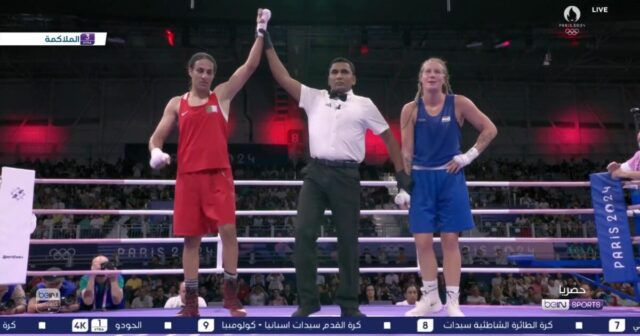Istvan Kovacs, the European vice president of the World Boxing Organization (WBO), has publicly asserted that Algerian boxer Imane Khelif is biologically male.
This claim, which raises serious questions about fairness in women’s sports, was made during an interview with the Hungarian news outlet Magyar Nemzet.
Kovacs disclosed that he alerted the International Olympic Committee (IOC) about concerns regarding male participation in women’s boxing as early as 2022. Despite these warnings, he claims that no action was taken.
“The saddest thing in the story is that the problem was not with the level of Helif’s testosterone, because it can be adjusted nowadays, but with the result of the gender test, which clearly revealed that the Algerian boxer is biologically male,” he said.
Kovacs further elaborated that five boxers, including Khelif, underwent testing by the International Boxing Association (IBA), and all were found to be male. Despite reporting these findings to the IOC, he lamented that there has been no response or action taken.
“In addition, at the Tokyo Olympics and the following World Championship, a total of five boxers were examined together with the Algerians, and all of them came out with the same result, they were indeed men. Of course, I immediately reported all this in writing to the IOC officials, but as incredible as it is, they have not responded to this to this day – claimed the amateur Olympic, world and European champion, and the former boxer who won everything among the professionals,” Kovacs said.
His concerns are particularly focused on Hungarian boxer Anna Luca Hamori, who is set to face Khelif in an upcoming match. Kovacs expressed his deep apprehension: “Hamori was simply not trained for this,” underscoring the physical risks she faces in the ring against a competitor whose biological advantages cannot be overlooked, according to Inside the Games.
But on Saturday, Hamori unfortunately lost to Khelif.
WATCH:
XY Chromosome Boxer Imane Khelif Just Pummeled Another Woman to Score a Unanimous Victory at the Olympics
Anna Luca Hamori is incredibly fortunate she didn’t get seriously injured.
The match was beyond disturbing to watch. It’s a miracle that Hamori managed to survive all three… pic.twitter.com/I1d3MTloRF
— The Vigilant Fox (@VigilantFox) August 3, 2024
Kovacs also referenced discussions with former women’s world champion Mária Kovács, who lamented the alarming statistic that there is now a 20 percent chance of sustaining serious injuries—such as testicular injuries—in women’s boxing matches due to this unprecedented situation.
Kovacs concluded saying, “By the way, a lot of people know wrongly, it is now not possible to revise the decision regarding the start, because if they were to exclude [Khelif], then the Italians would rightly say that Carini should enter the ring against Luca, and I will go further, the boxers beaten by Khelif in the African qualification tournament could also rightly say, they would have their place in Paris, not the Algerian.”
The Paris Olympics erupted in controversy again on Thursday after a “biological man” easily “prevailed” in an Olympic boxing match after smacking around a much smaller and weaker woman for just under a minute. This follows the Olympic organizers cruelly insulting Christians during the opening ceremonies with a Last Supper reenactment involving drag queens.
The boxing bout between Italian Angela Carini and her Algerian opponent Imane Khelif lasted just 46 seconds, with Carini dropping her helmet onto the floor while quitting and shouting, “This is unjust!”
The 25-year-old Carini then rightfully refused to shake hands with Khelif and fell to the floor bawling after just two vicious punches to the head from her Algerian tormentor, who had been banned from a significant boxing competition a year before the Olympics.
Carini told reporters following the bout she had never been slugged so hard in her life and was in too much pain to continue.
“I’m used to suffering. I’ve never taken a punch like that, it’s impossible to continue, Carini explained. “I’m nobody to say it’s illegal.”
“I got into the ring to fight, but I didn’t feel like it anymore after the first minute,” she added. “I started to feel a strong pain in my nose. I didn’t give up, but a punch hurt too much and so I said enough. I’m leaving with my head held high.”
Then, on Friday, the second boxer with male DNA brutally beats a contender at the Paris Olympics and wins the bout.
Taiwanese boxer Lin Yu-Ting, previously disqualified from the 2023 Women’s Boxing World Championships for failing to meet gender eligibility criteria, secured a decisive victory against Uzbekistan’s Sitora Turdibekova.
The IBA has made it clear that these athletes possess competitive advantages over their female counterparts, a claim supported by rigorous testing protocols.
“This disqualification was a result of their failure to meet the eligibility criteria for participating in the women’s competition, as set and laid out in the IBA Regulations. This decision, made after a meticulous review, was extremely important and necessary to uphold the level of fairness and utmost integrity of the competition,” the IBA said in its press release.
The IBA added, “Our Committees have rigorously reviewed and endorsed the decision made during the World Championships. While IBA remains committed to ensuring competitive fairness in all of our events, we express concern over the inconsistent application of eligibility criteria by other sporting organizations, including those overseeing the Olympic Games. The IOC’s differing regulations on these matters, in which IBA is not involved, raise serious questions about both competitive fairness and athletes’ safety.”
The IOC issued a statement defending its position. “Every person has the right to practice sport without discrimination,” they declared.
The IOC insisted that all athletes participating in the boxing tournament comply with eligibility regulations based on their passports and that these rules had been consistently applied during qualification events across various international competitions.
Read:










